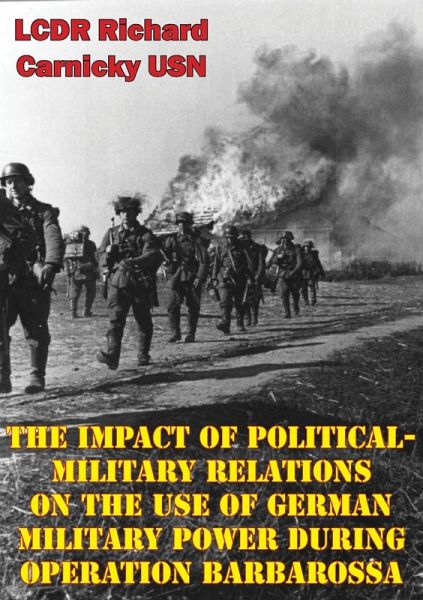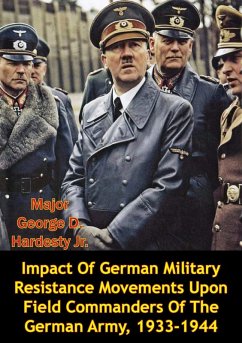
Impact Of Political-Military Relations On The Use Of German Military Power During Operation Barbarossa (eBook, ePUB)

PAYBACK Punkte
1 °P sammeln!
The German General Staff launched Operation Barbarossa in June 1941 assuming the eastern campaign would last only three months. However, within six months after the initiation of hostilities the Red Army blunted the Wehrmacht's attack outside the gates of Moscow, Operation Barbarossa had failed. Although a long standing and professional organization the German General Staff failed to achieve strategic success, despite significant success during the early stages of the campaign. Adolf Hitler's national goal of Russian extermination exceeded the German Army's capabilities. The war lasted nearly ...
The German General Staff launched Operation Barbarossa in June 1941 assuming the eastern campaign would last only three months. However, within six months after the initiation of hostilities the Red Army blunted the Wehrmacht's attack outside the gates of Moscow, Operation Barbarossa had failed. Although a long standing and professional organization the German General Staff failed to achieve strategic success, despite significant success during the early stages of the campaign. Adolf Hitler's national goal of Russian extermination exceeded the German Army's capabilities. The war lasted nearly four years and resulted in the devastation of western Russia, millions dead and the destruction of Germany. This thesis examines how the divergence between the Wehrmacht's capabilities and Hitler's ideological national objectives affected Operation Barbarossa.Through examination of the historical role the German General Staff held during military operations, this study addresses the linkage between German political and military relations during war. It begins with an analysis of the Prussian General Staff system under Moltke the elder. It follows the staff's development through the wars of German unification, prelude to World War I and, the interwar period leading up to Hitler's rise to power. It concludes with an analysis of Operation Barbarossa and the German General Staff's efforts to achieve strategic victory on the eastern front. Finally, it concludes with lessons modern military leaders should learn from the General Staff's mistakes.
Dieser Download kann aus rechtlichen Gründen nur mit Rechnungsadresse in A, B, BG, CY, CZ, D, DK, EW, E, FIN, F, GR, HR, H, IRL, I, LT, L, LR, M, NL, PL, P, R, S, SLO, SK ausgeliefert werden.













